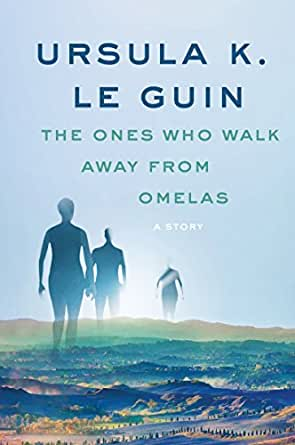#the ones who walk away from omelas
“The trouble is that we have a bad habit, encouraged by scholars and philosophers, as considering happiness as a something rather stupid. Only pain is intellectual, only evil is interesting. This is the sin of the artist: a refusal to admit that evil is dull and pain is boring.”— Ursula Le Guin, The Ones Who Walk Away From Omelas
The Ones Who Walk Away From Omelas
by Ursula Le Guin

The Ones Who Walk Away From Omelas
Scalzi just wrote his Twitter is “a single, unbroken string of testimonials” about Ursula LeGuin and I’m sure tumblr is too, but i’ll throw mine on the pile
Here is a story:
In my junior college creative writing class, we read The Ones Who Walk Away from Omelas. I had read it before, years ago, and knew the shape of it, but at 20 I knew a bit more about hard choices and dark places and the difference between Doing What’s Right and Doing What’s Easy than I did at 9. So it hit me anew.
Even now, every time I read it, it hits me anew.
The professor was a man perhaps a little too satisfied with himself in the way fundamentally insecure people are. He was unhappy in his marriage, in a vague sort of way, and he insisted we call him Doc, presumably to remind us that he was both Cool (not stuffy like those other professors) and Better Than Us (he had a PhD). He was so on point as a middle aged English professor stereotype you would almost think it was on purpose.
In class, we eventually got to the discussion question you always do with Omelas:
What would you do?
The professor indicated he would not leave, and professed doubt that anyone really would.
I remember being mildly aghast that anyone would say they’d stay, that anyone would choose personal comfort at the cost of someone else’s blatant and obvious suffering. Firm in my knowledge of Right and Wrong and perhaps a little self-righteous, I declared that I would leave. Immediately.
“Would you really?” he asked, patronizing and amused at my naiveté.
“Yes!” I said. “If that was all it boiled down to? If it was really that simple? Yes! Of course I would leave!”
The discussion moved on, and I never trusted that professor’s opinion on anything again, because men who patronize young activist women ought to be eaten by hyenas but apparently feeding them to hyenas is illegal or something. But the conversation stayed with me.
If that was all it boiled down to
If it was really that simple
Outside of the story, it is not that simple. I know too much about globalization and privileging profits over people on the one hand and the difficulty of setting up a working self-sufficient commune farm on the other to believe that realistically I could walk away from this society. I know too much about the history of this country, soaked in blood and writhing with unacknowledged hypocrisy, to ever be comfortable with staying.My professor, I think, tried to make the story complicated, to make us students examine the dark and selfish parts that must be lurking just below our surface. But the beauty of The Ones Who Walk Away from Omelas is that it is not complicated. It is simple.
When you realize Omelas rests on the unloved child, do you stay, or do you go?
The beauty of Omelas is that it winnows your choices down to this:
When faced with a society built on the suffering of fellow human beings, do you accept it, or do you do something?
In the world of the story, what you can do is walk away. Decide you will not be complicit to this anymore. Realize that comfort is not happiness, joy resting on the suffering of others is hollow, and a utopia without justice is no utopia at all. Walk away.
In the world I live in, the country I live in, I cannot walk away. There is nowhere to walk to. Everything is intertwined. Walking away is not a choice I have.
The choice I have is this:
Do I accept it, or do I do something?
Ursula Le Guin died and I am having an emotion
when w. h. auden said “evil is unspectacular and always human” and ursula k. leguin said “this is the great treason of the artist: a refusal to admit the banality of evil and the terrible boredom of pain”
For anyone who would like to read “The Ones Who Walk Away from Omelas,” the source text for SNW’s “Lift Us Where Suffering Cannot Reach” episode.
https://archive.org/details/the-ones-who-walk-away-from-omelas
